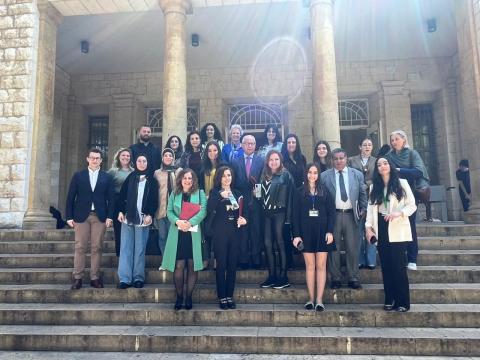

The Secretary-General of the Higher Population Council, Prof. Dr. Issa Al-Masarouh, and the Director of the Studies and Policies Unit in the Council, Ali Al-Mutlaq, made a working visit to the Lebanese Republic, which lasted for several days, for the purpose of discussing with the parties working and concerned with sexual and reproductive health issues about expanding the scope of work of ShareNet Jordan at the regional level, by including Institutions and experts from Lebanon to ShareNet Jordan and ShareNet International, by increasing the membership base of actors in the field of sexual and reproductive health, and by connecting and communicating members in the region to work on priority sexual and reproductive health issues in the region, and building strategic partnerships to exchange experiences and results knowledge and best practices.
The visit began with the participation of the Secretary-General and the Director of Studies and Policies in the meeting of the Executive Committee of the ShareNet International, which was held through the Zoom platform, where the Secretary-General presented the most important achievements of ShareNet Jordan during the first quarter of 2023, and the ongoing work to expand the scope of the knowledge platform for sexual and reproductive health and reproductive rights. (Share Net Jordan) at the regional level and the results of the visit to Egypt and future aspirations.
On the second day of the visit, two meetings were held, the first at the headquarters of the Economic and Social Commission of the United Nations for Western Asia (ESCWA) with Dr. Sarah Salman / Population Affairs Officer, which dealt with the most important areas in which cooperation with ESCWA could be possible, and a lengthy discussion took place on the study of international migration. In Jordan, which was funded by ESCWA, and the most important future directions and subsequent steps for this study. As for the second meeting, it was with the regional coordinator of the Ecumenical Disability Advocates Network (EDAN) Fadi Al-Halabi, where a lengthy discussion took place about programs related to health, reproductive and sexual rights that target people with disabilities in Lebanon, and the opportunities and obstacles for their inclusion in these programs on an equal basis with the rest of the population without discrimination or exception. Aspects and opportunities for future cooperation in joint projects were also discussed.
On the third day, the Population and Health Research Center at the College of Health Sciences / American University of Beirut hosted an extensive and lengthy meeting attended by 15 academic experts and representatives of active civil and international organizations in the field of reproductive and sexual health in the Lebanese Republic.
Prof. Dr. Joselene Digong from health sciences faculty in The American University of Beirut has represented the speech, followed by a speech from the Acting Director of the Population and Health Research Center at the Faculty of Health Sciences at the American University of Beirut, Dr. Stephen McCall, then the Secretary-General of the Council, Dr. Issa Al-Masarouh, gave a presentation on the current demographic situation in Jordan and related reproductive and sexual health issues among citizens and refugees, indicating the functions and activities of the Council in the field of providing information and studies that help in decision-making and setting policies and plans related to population issues and components of reproductive and sexual health. Further, the Director of the Studies and Policies Unit at the Higher Population Council gave a detailed presentation on the knowledge platform for sexual and reproductive health and reproductive rights in Jordan and the achievements of ShareNet Jordan since its establishment in 2016. He also addressed the goals of the initiative to expand the scope of work of the ShareNet Jordan platform at the regional level. The agenda of the meeting included presentations on research, awareness, service and training activities in the areas of reproductive and sexual health, presented by specialized experts representing civil, international and academic bodies in the Lebanese society, namely: Abad Association; Inclusion, Community Development and Care for All; Marsa Association; Lebanese Association for Family Health/International Planned Parenthood Federation; Lebanese Medical Association for Health; UNFPA/Lebanon Office; Working Group on Reproductive Health in the Arab Countries and Turkey/American University of Beirut; Women's Sexual Health Integration Program/College of Health Sciences at the American University of Beirut; The intersection between mental health and sexual and reproductive health / the Faculty of Medicine at the American University of Beirut, the meeting also included presentations about addressing the subjects about sexual and reproductive health by members of faculty at health and population researches center and department of enhancing health and community health, knowledge program for practice in health sciences faculty at the American University of Beirut.
At the end of the meeting, a lengthy discussion took place on the topics that were presented during the meeting and were answered by the relevant participants.
It is worth noting that the Higher Population Council hosts ShareNet Jordan, which works to strengthen the link between research results, policies and practices through the generation and dissemination of knowledge and the promotion of its use in the process of developing better policies and practices in the field of sexual and reproductive health. The Council is also considered the national contact point with the ShareNet International Foundation, which was established by the Dutch Ministry of Foreign Affairs as a knowledge base that brings together the experiences of Dutch institutions, partners from southern countries, and international institutions working in the field of reproductive health. For the purposes of strengthening the role of knowledge in building evidence-based policies and practices and ensuring that resources are used in a strategic manner to create a platform to support reproductive health research.







